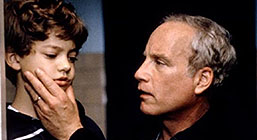|
|
|
|
Silent Fall
|
 |
|
Silent Fall, amidst Australian director Bruce Beresford’s American output, is a crushingly awful piece of work. The problems start with its star, Richard Dreyfuss. Watching this movie, as with some other movies that this actor has appeared in, I kept wondering: what is to be done with this guy? He rarely sits easily in his post 1970s roles. He has a cartoonish streak, but he’s no Robin Williams; and he often seems uncomfortable cast as a hero within straight dramas. Only in black comedies such as What About Bob? (Frank Oz, 1991), where the part is downright grotesque, is Dreyfuss truly enjoyable. Since the success of Stakeout (John Badham, 1987), filmmakers have attempted to construct vehicles for Dreyfuss that combine thrilling action, low comedy and intelligent themes. It’s a mixture that often fizzles, and it has never come out so flat as in Silent Fall. Dreyfuss plays Jake, a specialist in autistic children. He is called to the scene of a gruesome double murder; a man and woman have been knifed to death, leaving only their jittery teenage daughter (Liv Tyler as Sylvie) and a glazed, autistic son, Tim (Ben Faulkner), as uncertain witnesses. Dreyfuss goes through his usual motions. With the autistic boy, he puts on funny voices and cracks pop culture jokes. With his brooding wife, Karen (Linda Hamilton), and shifty cop friend, Mitch (J.T. Walsh), Jake paces and agonises. And to everyone else he offers, at the drop of a hat, helpful sermons on the ways and means of autism. It is an unbelievably ponderous and preachy piece on this level – almost an educational propaganda film. I expected Dr Oliver Sacks to walk in at any moment and summarise the key pedagogical points on a blackboard. It has a plot which most reviewers would decry as silly and implausible. But not me! I have a high tolerance for what others regarded as outlandish plots – let’s call them tall tales. As a matter of principle, I think that anything at all, no matter how fantastic or unbelievable, should be allowed into a plot if it can be made to work – if it can find its own, properly histrionic level. Many great films (starting with, oh, Hitchcock’s Vertigo [1958]) prove just this. Because Silent Fall is a fairly low-key piece, people baulk at the more extreme elements of its narrative. I think that this is Beresford’s fault; he hasn’t been able to find the necessary level of melodrama. In this story, everything hinges on little Tim’s gift of echolalia – his ability to “play back” precisely the words spoken during the primal murder scene … without being able to specify exactly what is happening or to whom. This is a wild idea reminiscent of a whole range of movies I admire, such as William Friedkin’s Cruising (1980), where a killer spoke with his father’s voice; or Brian De Palma’s Blow Out (1981), where Travolta’s character can hear a murder happening in his surveillance earpiece, but not see it; or Dario Argento’s absolutely outlandish horror-mysteries, where characters change voices, bodies, genders and identities in the slightest twinkle of a plot move. In Argento’s Trauma (1993), for instance, one character is mistaken for somebody else in the dark, because she happens to be holding a decapitated head in front of her own at a precise instant. Now that is a fine and crazy bit of plotting! And Argento knows how to make it work. But Beresford is no De Palma or Argento. When he is saddled with this kind of material, he delivers it with very little flair. Silent Fall is full of terribly dreary, one-dimensional elements. There’s a sinister Dr Harlinger (John Lithgow) obsessed with needles, medication and brutal psychological coercion, like one of the grotesques from The Young Poisoner’s Handbook (Benjamin Ross, 1995). There’s touch of Twin Peaks small-town mystery, as we learn about the tangled, adulterous lives of the parents who were killed. There’s a very forced sub-plot concerning Jake as a cowardly quitter. This is another De Palma echo, reminiscent of the fanciful Body Double (1984): Jake’s cowardice sets him up to be duped and manipulated for a while. But, once more, there’s no real kick, no vertiginous spin, in the way Beresford handles this aspect of proceedings. Once the film has exhausted the topic of autism, it wades into far murkier psychosexual waters involving the mysterious and neurotic Sylvie. Then the whole show drowns instantly. By the way: what on earth does the title mean? Apart from the cornball reference to autism, there’s a sudden shot near the end of snow falling in slow motion – silently! – so I guess that may account for it. I have to say that Beresford’s high reputation as a director remains a mystery to me. Originally slated to direct The Bridges of Madison County (1995) before Clint Eastwood mercifully took over the job, Beresford is obviously regarded by Hollywood as a low-key classicist. Silent Fall is the sort of impersonal assignment he invariably helms these days: mildly dramatic, lamely comic, vaguely topical. But Beresford lacks Eastwood’s subtle, poetic gifts. Too often, his directorial decisions are dull and hyper-conventional. There’s nothing to Silent Fall beyond the mechanical resolution of its enigmatic plot; no resonance, whether uplifting or disturbing, remains once the meagre narrative possibilities have been exhausted. I’d already started forgetting the movie by the time I had reached the back exit after the final credits. MORE Beresford: Rich in Love, Black Robe © Adrian Martin October 1995 |
![]()